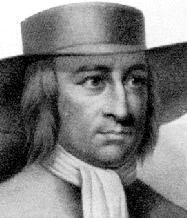Talk:George Fox
 Image of George Fox, who founded the Quakers, for a future article.
John Stephenson 15:24, 24 August 2007 (CDT)
Image of George Fox, who founded the Quakers, for a future article.
John Stephenson 15:24, 24 August 2007 (CDT)
Continuing work
I have made a start on enlarging this article, and will continue with it intermittently. In the course of working on it I have improved a statement which might have been misleading. --Martin Wyatt 21:48, 2 November 2012 (UTC)
- Nice work so far! (Chunbum Park 13:07, 3 November 2012 (UTC))
Having put a heading for Appearance and character, I need to add something under it, but apart from that, I have probably done all I am going to do for the moment. I can add more references if that is thought necessary. --Martin Wyatt 21:28, 12 November 2012 (UTC)
Some thoughts
At the top of this talk page John Stephenson included a picture of Fox. It's a 19th century engraving rather than a contemporary portrait, but is there any indication it might be based on an older depiction? If so it might be worth including.
The introduction mentions that Fox received a vision on Pendle Hill. I've changed the wording of this as "passing over" was an odd phrase, but was wondering if the location is important to the introduction. I expect most readers won't know where Pendle Hill is, so it might be worth saying simply "on the Lancashire border", and it is explained in more detail in the 'early life' section. Also regarding the introduction, I think it might be worth mentioning that Fox and the Quakers were initially based in northern England, but missionary work took them across the country (as explained in the 'preaching' section).
Might it be worth including the charges Fox was imprisoned on in Nottingham and Derby? It's implied it was for preaching, but I think more detail might be of interest to a reader. Was he fined, or was the imprisonment the extent of his punishment, and was it a matter of days, weeks, or months?
The 'preaching "the Truth"' section opens with "In 1651 Fox was in Derbyshire and South Yorkshire, where he found people who had had similar experience to his". I don't think it's really clear what "similar experiences" are in this instance, and it could have been suffering imprisonment of receiving openings.
James Nayler is introduced without much build up. Without wishing to divert too much from Fox's life, as opposed to the history of the Quakers, could a sentence more be added on Nayler? Was he convinced by Fox personally, were the two close friends? As an aside "convince" is the term used when referring to Margaret Fell; would "convert" be an acceptable alternative?
What did Naylor do to bring the Quakers into disrepute?
I like the 'appearance and character' section, particularly the detail of contemporary reactions to Fox. For the opening sentence, would it be simpler (and still accurate) to simplify "Fox was above average height, powerful and resilient in body" to "Fox was taller than average and strongly built"?
I've made a few changes to wording, they can be seen here: [1]. I've tried to avoid changing the meaning of anything, but if I've done so or you don't feel my changes were an improvement feel free to undo them. Richard Nevell 20:02, 17 November 2012 (UTC)
- Article with Definition
- Religion Category Check
- History Category Check
- Developing Articles
- Nonstub Articles
- Internal Articles
- Religion Developing Articles
- Religion Nonstub Articles
- Religion Internal Articles
- History Developing Articles
- History Nonstub Articles
- History Internal Articles
- Religion Underlinked Articles
- Underlinked Articles
- History Underlinked Articles
- History tag